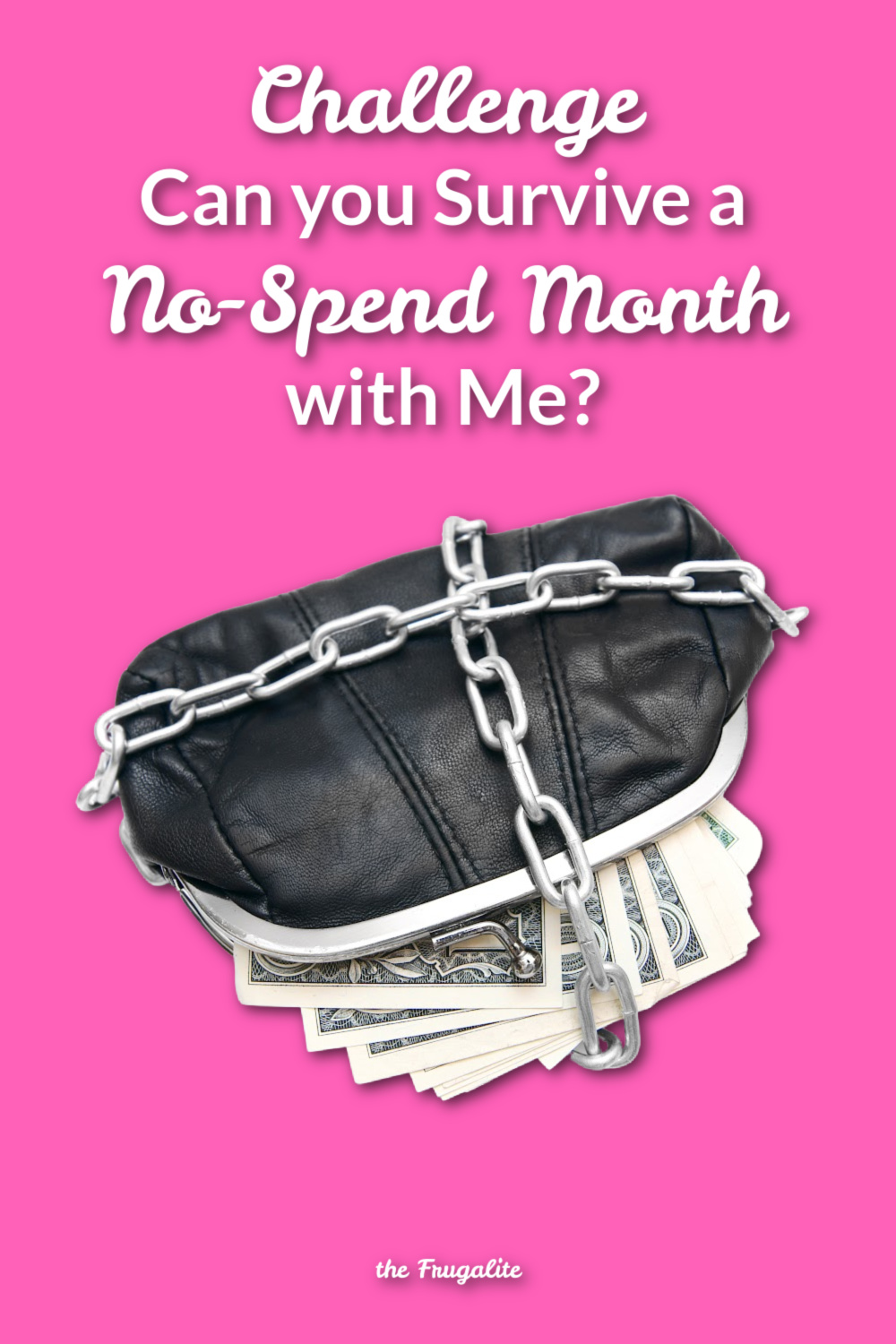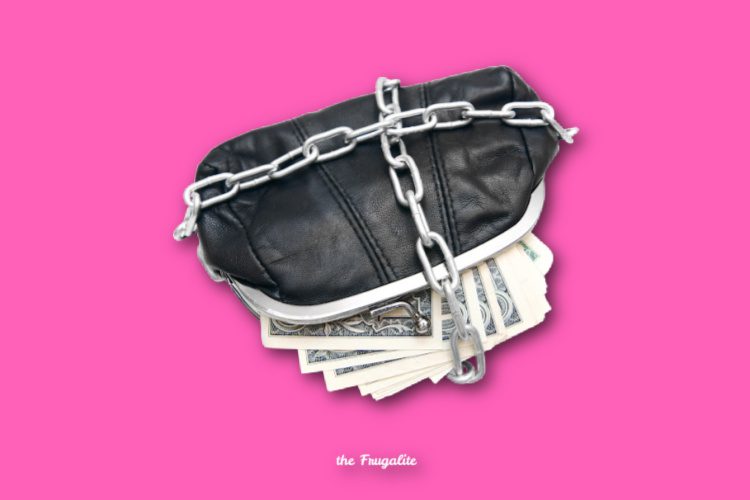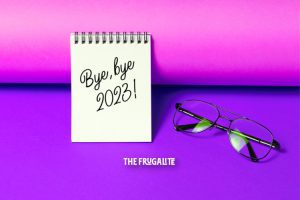(Psst: The FTC wants me to remind you that this website contains affiliate links. That means if you make a purchase from a link you click on, I might receive a small commission. This does not increase the price you’ll pay for that item nor does it decrease the awesomeness of the item. ~ Daisy)
As much as I hate spending money, I know myself, and I know I’m an impulse shopper (much to my dismay). For me, I’ve tried a lot of things to help with my spending, including the cash envelope system, only buying with cash, making a budget, rewriting my budget, and then redoing it again for good measure. Nothing seems to stick, though. So, together with all you Frugalites, I’m going to do a No-Spend month.
What exactly is a “No-Spend month,” and why should I do one?
While it sounds scary, it really isn’t as horrible as it seems. It doesn’t mean that you can’t buy food, gas, or diapers. Essentials are essentials for a reason. What it does mean, though is that you can’t buy things that aren’t essentials. Think take-out, new furniture, trips to the salon, or – my personal weakness – dollar store trips.
I like to think of it as a No-Spend month as the ultimate kick-start to a budget. It’ll help give you a great idea of how much you’re actually spending on things and give you an idea of what you really need to get by. It will also help set up the groundwork for a successful budget afterward.
It may be a bit tight, it may be a bit tricky, but I truly believe it will be worth it.
What’s your reason?
When you come up against a challenge, be it small or big, having a reason – a “why” – behind what you’re doing makes a HUGE impact. I’m going to ask you to dig deep here, guys.
In the last month, I’ve moved to a completely different area. I’ve started a brand-new job where I work nights by myself. I’m now living in a rural town instead of a big city, and for the first time. And, within it all, I’ve spent way more than I intended. It’s what happens when you stop paying attention.
What does that have to do with my “why?” Well, this year, I want to be debt-free. I made a good dent last year, paying off two credit cards, but this year, I’m hoping to pay off my remaining 30k in debt. All the spending I did in January definitely wasn’t taking me in the right direction.
So let’s break down your “why.” Grab something to write with and something to write on. I mean it. Get up, grab something – anything. A clean napkin and sharpie, an old bill envelope and one of your kids’ crayons – anything. Don’t worry; I’ll wait for you.
Okay, you ready?
Let’s write it out.
On your piece of paper, write down the answers to the following;
- Why do you want to do a No-Spend Month?
- Why do you want (answer to Q1)?
- Why do you want (answer to Q2)?
- Why is (answer to Q3) important?
Need an example? Here’s mine;
- I want to do a No-Spend Month because I think it will help me with my budget by helping me to spend less.
- I want to get better at budgeting and spend less because I want to become debt-free this year.
- I want to be debt-free, so I can start saving money and be less stressed about finances all the time.
- Because it will set me up for future success, I can start working on saving for my dream house, family planning, and if I need something, I won’t have to struggle. It will give me peace of mind.
Does that make sense? If you don’t get deep enough with questions 2 / 3, you can add in another “why.” It’s a simple process, and you can use this for any goal, but getting to the root of why you want something will make your resolve stronger. Write it down, stick it somewhere, and look at it every day. When you have a weak moment, get back to that sheet of paper and remember why you started this.
Your reason doesn’t have to be the same as mine; it could be to go on a vacation, to test your willpower – anything. Just get to a deeper “why,” elaborate on it, and envision it. Trust me; this process will help.
Okay, I’ve decided to do this. Now what?
First thing’s first, if you don’t already have a budget, make one. This is going to help make sure you don’t overspend in other areas. Here are the things you’re going to want to make sure you keep:
- Car payments
- Insurance
- Groceries
- Daycare
- Mortgage/rent
- Power/hydro
- Heat
- Water
- Phone/Internet/TV bills
- Gas
Here are some things you’re going to want to remove:
- Toys/games
- Take-out
- Coffee
- Decorations
- Throw pillows
- Movies
- Date nights (but only the ones that cost money!)
- Basically, anything you can live without, without sacrificing quality of life.
Here are some things that you may want to consider removing but are not completely necessary. This section is totally up to your discretion.
- Subscriptions (Spotify, Amazon Prime, Netflix, etc.)
- Cable
- Gym Memberships (try home workouts instead!)
The point here is not to deprive yourself of every little joy but, instead, to cut back. Maybe you drop Netflix and keep Prime. Find a good balance.
Do an audit on your personal finances
Daisy has talked about the importance of doing an audit on your expenses before. It’s always a good idea to start with how you are spending your money already when setting up a budget. Maybe you have a monthly subscription coming out of your card every month to something you haven’t even been using .
I personally found I’d been paying $8/month for over a year to Microsoft office for a computer I hadn’t used in almost a year by doing an audit once. I’ve heard horror stories, though, where people spend hundreds a month on things they have no clue they’re even paying for.
Anyways, when you do an audit, you can see where you are already spending your money and how much you’re really spending, not just what you think you’re spending. You have to know where you are to know where you’re going.
One last thing…
While we are all going on this No-Spend month together, emergencies may happen. If your car breaks down, and you need to get it fixed, that’s essential. That comes out of your emergency fund (if you don’t have one, you should definitely start one). If your fridge breaks down and suddenly stops working, you’re going to need a new one. I won’t tell you otherwise. If it’s a matter of you just want a new fridge, but your old one still works? Well, the latter is the kind of spending we’re pausing.
What next?
Well, now you make your No-Spend month official. You know how much you’re spending. You know where you can cut back. Now it’s time to stop the spending and hold yourself accountable. Heck, y’all are going to be keeping me accountable, too since we’re doing this together. Every week I’ll be doing a check-in with some tips and advice for staying frugal and working your way through things. If you’re going to be doing this spending freeze with me, drop a note in the comments, let me know you’re in and tell me what is something you think you’ll struggle the most with? You never know; someone else may just have a good tip!
Happy saving, and see you in a week!
About Chloe Morgan
Chloe Morgan grew up living with a tight budget. In her late teens and early 20’s all the lessons she’d learned started to slip, like it does for many college-age students on their own for the first time, and with their first credit card. As she’s gotten older, she’s started to deal with the repercussions and has taken on a frugal way of living, keeping her costs low, as she pays off debt and saves for her future. Chloe lives in Northern Ontario, Canada, with her cute dog, Rhea.












10 thoughts on “Challenge: Can you Survive A No-Spend Month with Me?”
My approach is a bit different. Instead of a zero-spending month, I prefer a year around minimum spending effort while leaving open the possibility of taking opportunities that might need some spending for unforeseen situations to increase one’s earning skills, to add to one’s prepper-related food supplies and/or gardening capabilities and equipment additions, plus spending to cope with the types of disasters that insurance companies do not sell policies to cover. Those latter disasters are what the prepper community is all about learning and gearing up to handle.
Some examples (among very many without room here to list): is it more important to rack up a checkmark on a not-really zero spending month OR to acquire that indoor portable cooking burner that uses non-carbon monoxide producing fuels so you can cook inside during a power outage when your region of the country suffers a long and hard freeze?
Is that checkmark more important than possibly needing to spend a little money to learn how to earn some side hustle dollars such as this very new article explains?:
8 Side Jobs You Can Do Online to Earn Extra Cash, BY LANDO LOIC, 5 Feb 2022
https://www.makeuseof.com/side-jobs-online-to-earn-extra-cash/
At the same time it’s important to learn how to cut back on expenses that no longer meet your needs. Some of the most obnoxious are subscriptions with automatic yearly renewals that if you lose track of them … you may pass up the opportunity to cancel in time. That might leave you with the only escape of canceling the charge card you once used with them and replacing it for the rest of your online spending (especially since so many brick and mortar stores have gone out of business).
BTW, I happen to agree very much with avoiding gyms for exercise. Look for books 1 and 2 by Paul Wade on Amazon. His books are short-titled CONVICT CONDITIONING based on prison experience of guys who learned how to maintain muscle mass and cardio condition without gym-style equipment.
https://www.amazon.com/Convict-Conditioning-Weakness-Survival-Strength/dp/1942812159/ref=sr_1_3
https://www.amazon.com/Convict-Conditioning-Advanced-Training-Bulletproof/dp/1942812140/ref=sr_1_4
And of course since both books are well past the 6 months since the publisher released them, they are both fair game for a free interlibrary loan request.
And here’s an article for the ladies:
No equipment? 12 cardio exercises you can do using just your body; Get your heart rate up and burn calories with these fun moves, Feb. 4, 2022, By Stephanie Mansour
https://www.today.com/health/diet-fitness/best-cardio-exercises-rcna14823
Only you can decide which is more important to you — that challenge checkmark for one month OR a year-around conscious effort to be economical but without passing up opportunities to increase your capabilities, gear and earning abilities while acting as your own personal disaster preventer or mitigator.
–Lewis
Hi Lewis, thank you so much for sharing! I definitely am interested in checking out those books at my local library. As for your approach to spending, I totally agree with making small purchases to make yourself more prepared for situations. No spend challenges definitely aren’t for everyone, and I dont recommend them for months on end, more as a way to help kick bad spending habits to the curb.
I’m in…in not spending, i plan to take that amount out in cash at the end of the week to build a cash emergency fund too.
Hi Keza, so glad you’ll be joining me over the next month. And I love that you’re putting all the money your saving towards an emergency fund!
I could do this easily, if it weren’t for books and DH’s collections. I just bought 3 books today. Okay, how about just free ones!
I know what you mean about books, they tend to be one of my weaknesses as well, being an avid reader. I try to utilize the library as much as possible to help.
I’m in, Chloe! My biggest struggle will be with take-out. Good luck to all.
Hi Donna, I totally get this. Takeout is almost as bad as an addiction for some people, and it’s a habit I’m trying to break as well. That’s actually part of the reason I decided to do this challenge, so we’ll just have to keep each other accountable.
I’m in. I’m starting this Sunday going the full 30 days into March. I’m a huge dollar store shopper as well as impulse Amazon shopping. It seems like I never have enough prepping items and I always buy 2 or more of everything. My goal is to save the money for a fireproof safe and gutters for my house to assist in my water irrigation system.
Yes, I totally get what that’s like. I’ve found if I’m going into the dollar store, having a set list, and only enough cash on me to pay for those items helps. I leave the rest of my wallet in my car. Just remember why you’re doing this, and it’ll be worth it!